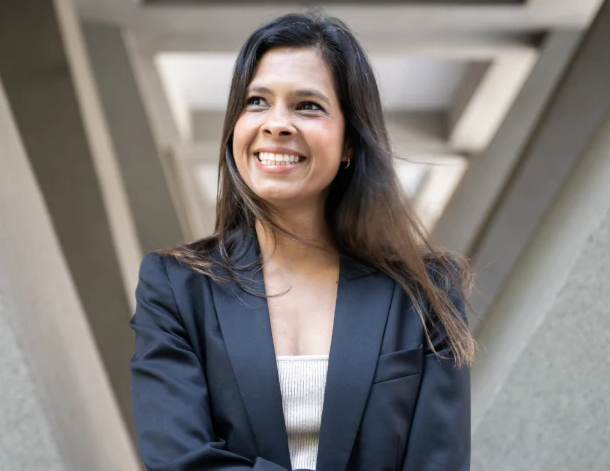
Vihari Ross of Antipodes. Picture: Louie Douvis
Vihari Ross is still a little traumatised by Donald Trump’s time in the White House.
Like many Australians, the former head of research at Magellan had headed to Byron Bay for a summer break in December 2017 just as the former US president unveiled a Christmas gift to the nation in the form of tax cuts. “I was in the car trying to update my models and hot-spotting to my phone to upload them,” she recalls.
Trump’s presidency was chaotic, unpredictable, and disruptive in every sense of the word. But while he divided the nation, he also united the sharemarket bulls who are once again excited at the prospect of his return to Washington.
Ross has since joined global fund manager Antipodes as a portfolio manager and warns that there is an air of complacency around the outcome of the election and its consequences.
Quality and growth are both expensive relative to their history and the value factor.
— Vihari Ross, Antipodes
She is among the presenters at next week’s Sohn Hearts & Minds charity conference in Adelaide. “Everyone believes Trump was good for the economy in 2016,” she says. “The economy was just good in 2016, and he happened to be the president then.”
The direction of the economy and how the central bank handles monetary policy still matters more to her than who is in charge.
She is not convinced of the election outcome or if Trump’s playbook is all that reliable. That is, the US dollar could offset tariffs, an end to central bank independence could spook bond markets that are already worried about rising deficits, and support of the energy sector could be deflationary.
However, Ross says the enormous US exposure amassed by superannuation funds means that the election matters more to short-term wealth in Australia than ever before.
Ross and Antipodes think global investors are over-exposed to the US sharemarket, which is both over-concentrated and expensive. The firm is sticking to its value approach to investing, and while the American market remains its largest exposure, it has spread more of its bets into Europe and Asia.
Ross says extreme levels of market concentration are unusual, but not unprecedented. She is as worried about excessive valuations in parts of the market as she is about the high concentration.
In fact, she adds, that some of the magnificent seven tech stocks that dominate the US sharemarket do stack up on valuation grounds. The fund owns three of the seven – Amazon, Microsoft and Meta.
Instead, she says that some of the so-called high-quality companies – defined by high levels of profitability – are excessively valued as investors overpay for durability.
A head scratcher
“Quality and growth are both expensive relative to their history and the value factor,” she says. The examples she cites are Mexican food chain Chipotle and big box retailer Costco, which are both trading at multiples of 50 times next year’s earnings compared to 30 times in the past.
Both companies are growing profits by around 10 per cent a year, yet are more expensive than Microsoft, which is beating them on growth and profitability and is generating more cash flow.
Another head-scratcher for Ross is the disconnect when it comes to China. Global investors have labelled the Asian nation as “uninvestable” and are overlooking its sharemarket in favour of Indian stocks – or even Australian banks.
But she says that hasn’t stopped them from bidding up US-listed stocks that rely on China to support their growth, such as Starbucks, Nike, hotel chain Marriott, and even Elon Musk’s Tesla. Nike and Starbucks, for example, rely on China for 60 per cent of its growth. That created a valuation mismatch between highly defensive Chinese companies and US firms with links to China that investors continue to buy and are arguably more exposed to.
Ross is making her debut at the Sohn conference on November 15 where fund managers will pitch their highest conviction stock. She is not giving too much away other than to confirm her pick is outside the US.
Could it be a European bank? The sector hasn’t been a source of lucrative sharemarket returns, but Antipodes did make money buying into Italian lender UniCredit.
Ross says her team is now leaning towards France’s Société Générale, which is well-capitalised and should benefit if long-term European bond rates increase. It has also built a fast-growing digital bank.
The stock is trading at a multiple of just three times next year’s earnings, and Antipodes analysts estimate the bank will return 50 per cent of its market capitalisation to shareholders in the form of dividends and buybacks over the next three years.
“That’s a nice return that blows CBA out of the water.”
The Australian Financial Review is a media partner of Sohn Hearts & Minds.
This article was originally posted by The Australian Financial Review here.
Licensed by Copyright Agency. You must not copy this work without permission.
Disclaimer: This material has been prepared by The Australian Financial Review, published on 5 November 2024. HM1 is not responsible for the content of linked websites or content prepared by third party. The inclusion of these links and third-party content does not in any way imply any form of endorsement by HM1 of the products or services provided by persons or organisations who are responsible for the linked websites and third-party content. This information is for general information only and does not consider the objectives, financial situation or needs of any person. Before making an investment decision, you should read the relevant disclosure document (if appropriate) and seek professional advice to determine whether the investment and information is suitable for you.